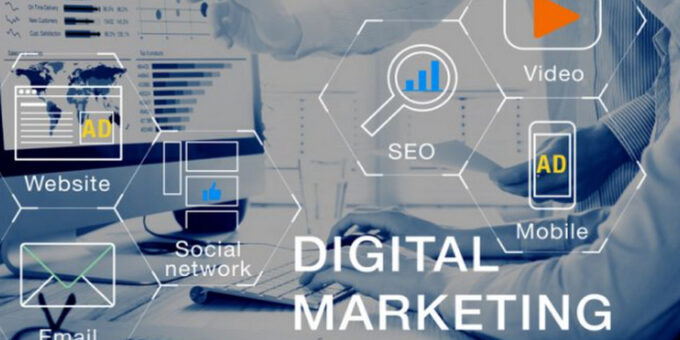
Digital marketing has revolutionized how businesses connect with customers. By leveraging online platforms, companies create impactful campaigns that drive results. It is a vital tool for reaching audiences and staying competitive in today’s fast-paced world.
What Is Digital Marketing?
Digital marketing refers to using digital channels to promote products or services. It includes strategies like social media, email, SEO, and content marketing. Unlike traditional marketing, it allows precise targeting and measurable outcomes.
Why Digital Marketing Matters
Digital marketing matters because most consumers now spend significant time online. Businesses that adopt these strategies reach broader audiences. Moreover, it provides cost-effective solutions for small businesses competing with larger companies. With real-time data, marketers can optimize campaigns for better results.
Key Components of Digital Marketing
Search Engine Optimization (SEO)
SEO is essential for improving a website’s visibility on search engines. It focuses on optimizing content and structure to rank higher. By using targeted keywords, businesses attract more organic traffic. Additionally, technical SEO ensures faster loading and mobile compatibility.
Content Marketing
Content marketing focuses on creating valuable, relevant content for audiences. It builds trust and positions brands as industry leaders. Popular formats include blogs, videos, and infographics. Quality content also supports other strategies like SEO and social media marketing.
Social Media Marketing
Social media marketing engages audiences on platforms like Instagram, Facebook, and LinkedIn. Businesses share updates, promotions, and stories to build brand awareness. Paid ads on these platforms help reach specific demographics quickly. Social media fosters customer loyalty and improves engagement.
Email Marketing
Email marketing delivers personalized messages directly to users. It nurtures leads and maintains relationships with existing customers. Effective campaigns include attractive subject lines and clear calls to action. Automation tools streamline sending timely, targeted emails.
Pay-Per-Click (PPC) Advertising
PPC advertising drives instant traffic through paid search ads. Businesses bid on keywords to appear at the top of search engine results. Platforms like Google Ads ensure maximum visibility for time-sensitive promotions. PPC is a great way to boost sales quickly.
Benefits of Digital Marketing
Global Reach
Digital marketing enables businesses to connect with audiences worldwide. Unlike traditional methods, it eliminates geographical barriers. Small businesses can access markets previously unreachable.
Cost-Effective Solutions
Digital marketing is often more affordable than traditional advertising. Strategies like social media posts and email campaigns require minimal investment. Even paid ads offer better ROI due to precise targeting.
Data-Driven Insights
Analytics tools provide valuable insights into campaign performance. Marketers can track metrics like clicks, conversions, and bounce rates. This data helps refine strategies and improve results over time.
Targeted Advertising
Unlike traditional marketing, digital marketing targets specific demographics. Marketers use data to tailor ads based on age, location, and interests. This ensures higher engagement and better conversions.
Challenges in Digital Marketing
High Competition
The digital space is crowded, with countless businesses vying for attention. Standing out requires innovative strategies and unique content. Companies must continuously adapt to changing trends to stay ahead.
Privacy Concerns
As digital marketing relies on user data, privacy concerns arise. Stricter regulations like GDPR emphasize transparency and consent. Marketers must prioritize ethical practices to build trust with their audiences.
Rapidly Changing Algorithms
Search engines and social media platforms frequently update their algorithms. These changes impact visibility and reach. Staying informed and flexible is crucial to maintaining campaign success.
Strategies for Digital Marketing Success
Set Clear Objectives
Define specific goals before starting any campaign. Whether increasing website traffic or boosting sales, clear objectives guide your strategy.
Understand Your Audience
Research your target audience to understand their preferences and behaviors. Use this information to create personalized content and ads.
Leverage Multiple Channels
Use a combination of channels like social media, email, and SEO for maximum impact. An integrated approach ensures better visibility.
Optimize for Mobile
With most users browsing on mobile devices, mobile optimization is essential. Ensure your website is responsive and fast-loading.
Use Analytics
Regularly monitor campaign performance using analytics tools. Adjust strategies based on data to improve results continuously.
Emerging Trends in Digital Marketing
Artificial Intelligence
AI is transforming digital marketing with tools like chatbots and personalized recommendations. It enhances efficiency and user experience.
Video Content Dominance
Video content remains highly engaging, driving better results across platforms. Short-form videos on TikTok or Instagram Reels are particularly effective.
Voice Search Optimization
Voice search is growing as more users rely on virtual assistants. Optimize for natural, conversational keywords to stay relevant.
Conclusion
Digital marketing is an essential tool for modern businesses. It enables brands to connect with audiences, build trust, and achieve measurable success. By embracing innovation, understanding trends, and refining strategies, companies can thrive in the digital age.